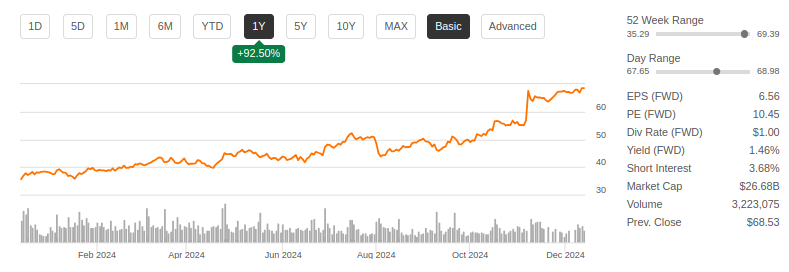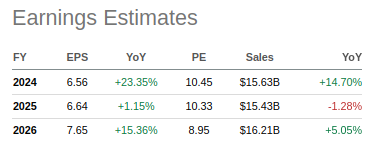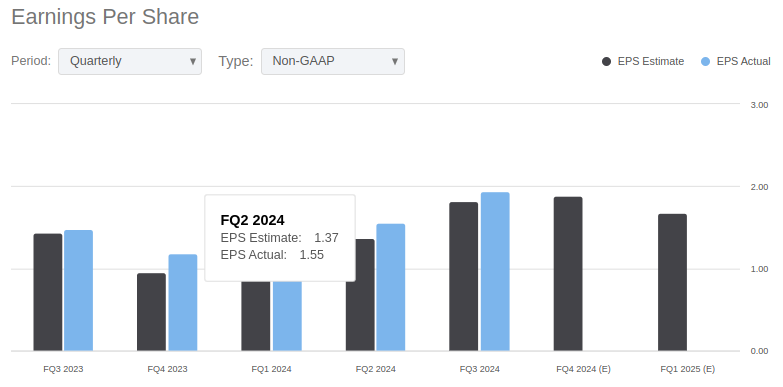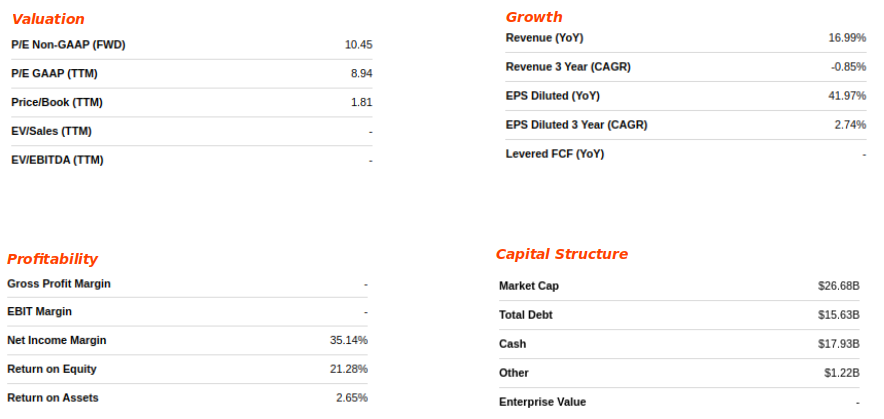About - Synchrony Financial : SYF
Summary
- Synchrony Financial is a good buy due to solid fundamentals, strong financial health.
- Impressive Q3 results with $1.94 diluted EPS, 70.4 million active accounts, and a 15.04% net interest margin indicate robust profitability and growth potential.
- Valuation metrics, including low P/E and PEG ratios, highlight SYF's strong cash flow generation and undervaluation relative to earnings growth potential.
- Risks include interest rate fluctuations, regulatory pressures, and dependence on retail partners, but the diversified portfolio and efficient operations support long-term growth.

Business
Synchrony Financial, together with its subsidiaries, operates as a consumer financial services
company in the United States. It provides credit products, such as credit cards, commercial credit
products, and consumer installment loans. The company also offers private label credit cards, dual
co-brand and general purpose credit cards, short- and long-term installment loans, and consumer
banking products; and deposit products, including certificates of deposit, individual retirement
accounts, money market accounts, and savings accounts, and sweep and affinity deposits, as well as
accepts deposits through third-party securities brokerage firms. In addition, it provides debt
cancellation products to its credit card customers through online, mobile, and direct mail; and
healthcare payments and financing solutions under the CareCredit and Walgreens brands; payments and
financing solutions in the apparel, specialty retail, outdoor, music, and luxury industries, such
as American Eagle, Dick's Sporting Goods, Guitar Center, Kawasaki, Pandora, Polaris, Suzuki, and
Sweetwater. The company offers its credit products through programs established with a group of
national and regional retailers, local merchants, manufacturers, buying groups, industry associations,
and healthcare service providers; and deposit products through various channels, such as digital and
print. It serves digital, health and wellness, retail, home, auto, telecommunications, jewelry,
pets, and other industries. The company was founded in 1932 and is headquartered in Stamford,
Connecticut.

Moat & Earnings
Synchrony Financial is signaling quite clearly, in the third quarter, what kind of operational health
and growth potential the company has. With such impressive diluted EPS of $1.94, such strong profitability
tells you that Synchrony is doing a great job of turning revenue into earnings while resisting the urge
to increase costs. Solid customer retention and acquisition, which supports sustainable revenue growth,
the company has 70.4 million active accounts. The current rising demand for credit, along with the rising
interest rates that are redounding to the bank, would definitely benefit from the 15.04% net interest
margin, which indicates the sound supervision of loan products resulting in efficient lending and strong
returns. Taken together, these metrics show that Synchrony is on solid ground to keep growing and to make
for an attractive investment with an expanding but stable business model.


The third quarter results show an increase of 38 basis points (bps) for both 30+ days past due and 90+ days past due loan receivables and an increase of 27 bps. This mild rise in delinquencies, while just that, is a sign for investors to watch, signaling a possible decline in the credit quality of Synchrony’s loan book. A more meaningful signal is the 90+ days past due increase over both the previous month and the same month last year. Specifically, it indicates accounts in deeper arrears that may or may not end up being written off or requiring provisions for credit losses.

A PEG ratio below 1.0 typically suggests that a stock is undervalued relative to its expected earnings growth, and SYF's PEG ratio is well below the sector median of 0.74. This signals that the stock has strong growth potential relative to its current price. Its growth is solid but looking there is still room for growth and expand into new markets. Furthermore, SYF’s Price-to-Cash Flow ratio of 2.67 is substantially lower than the sector median of 11.28, pointing to the stock’s strong cash flow generation and suggesting it is undervalued based on its ability to produce cash. Its strong cash profile is a proof that the company is generating a significant amount of cash flows. These ratios collectively make a compelling argument that SYF represents a strong buy opportunity.
Risks
One risk to which Synchrony Financial Synchrony is exposed is the environment of interest rates
and macroeconomic changes. Rising interest rates have increased its net interest income, but
if consumer spending slows down or interest rates rise further, it may deteriorate its credit
quality if loans become hard to repay. Higher default rates, therefore, and higher provision
for credit losses would be expected to affect profitability. Regulatory pressure is another
risk, especially as the company with such an expansive presence in consumer credit finds its
way. Compliance costs may increase due to any change in lending regulations or new consumer
protection laws, or lending opportunities could be reduced. Additionally, Synchrony’s reliance
on retailers to provide credit partners makes it vulnerable to the risk of dependence on retailers,
and in particular, the risk of disruption to its credit card base related to financial difficulties
or ‘retail shift’ by key partners into alternative credit providers.
Conclusion
In the long term, they’re in a strong position: their profitability is solid, their
operations are efficient, and a diversified portfolio with resilience against market volatility.
A key strength is the company’s ability to grow net interest income in an environment of rising
rates. As macro makes it appear more uncertain than ever to be up and running, Synchrony is doing
the right thing and positioning itself to be even more successful. By and large, the prospect of
Synchrony as an investment here in the long term is positive. The company has a great trajectory
for growth, excellent operating efficiency, and a good revenue base with diversification that
should propel stable, profitable growth moving forward.